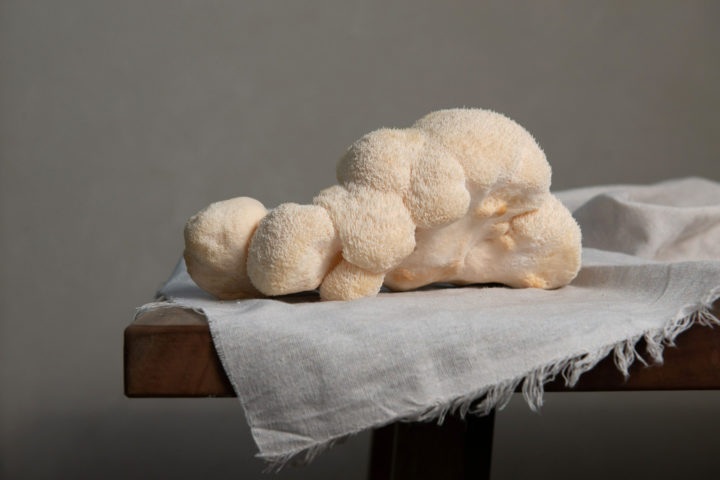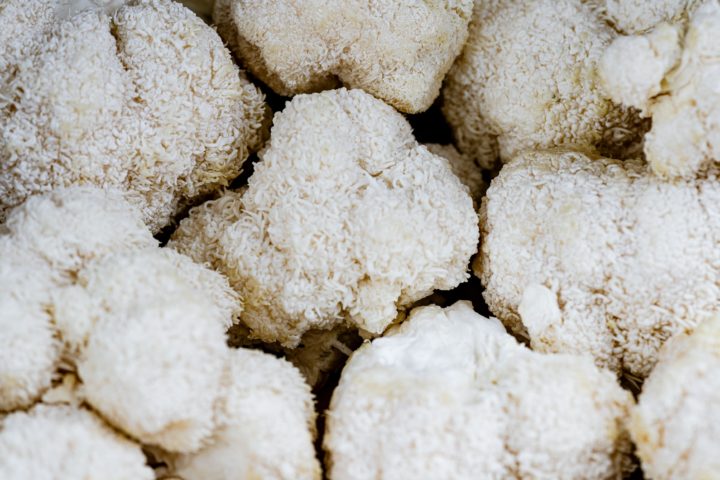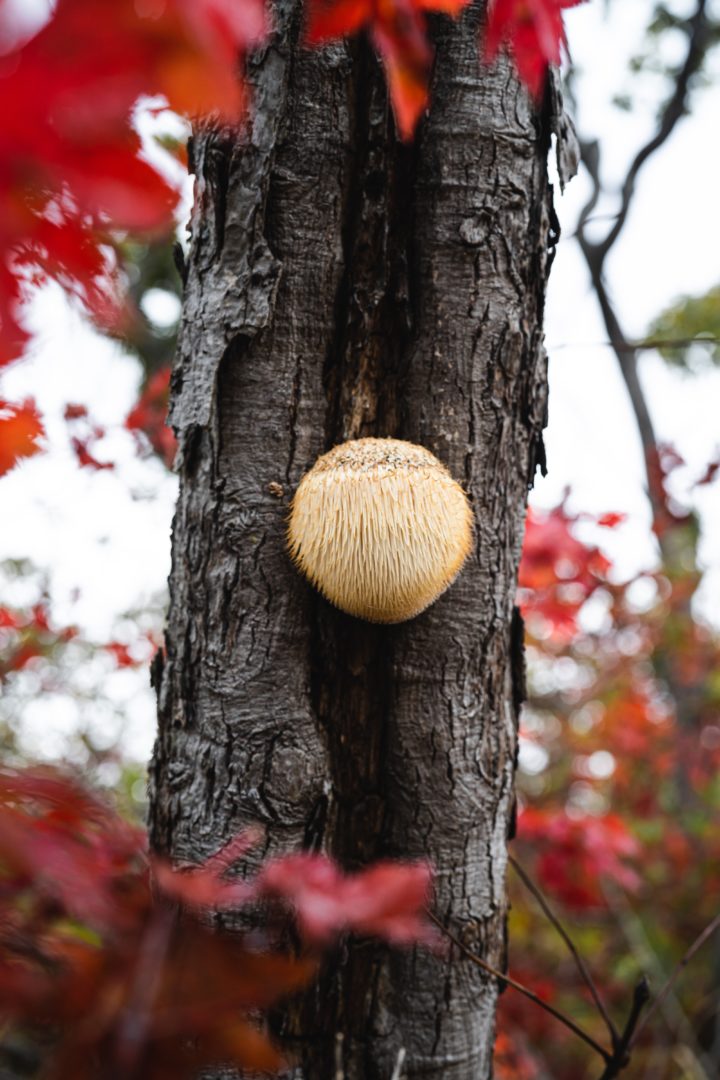Lion’s Mane Mushroom grows on dead hardwood trees and ingesting it can help regulate blood sugar, improve mental health, and fend off cancer. The mushroom is a member of the tooth fungus family, which is also known as the lion’s mane mushroom, the mountain-priest mushroom, and the bearded tooth fungus. A lion’s mane is a type of pharmacological mushroom. These species are native to Asia, Europe, and North America.
These mushrooms are effective in treating a variety of conditions, including Alzheimer’s disease, dementia, stomach difficulties, and many others. Additionally, they are a common nootropic ingredient in pre-workout supplements to support brain health and cognitive function.



Here, we’ll talk about the potential advantages of Lion’s Mane Mushrooms as well as practical implications and negative effects.
What Is Lion’s Mane Mushroom?
Lion’s mane mushrooms are white, large, and scruffy and become more like a lion’s mane as they get bigger. They are also known as Yamabushitake. People in Asia utilize these mushrooms for both food and medicine. According to several studies, they can offer numerous health benefits, such as reduced inflammation and improved mental and cardiovascular health. They are consumable or available as supplements. Additionally, you can consume lion’s mane mushrooms raw, roasted, dried, or in tea. This is a great source of potassium, vitamin D, and iron.
What are the Uses of Lion’s Mane Mushroom?
The lion’s mane mushroom has neuroprotective properties, which suggests usefulness in the treatment of nerve damage as well as neurodegenerative illness. In various Asian nations, lion’s mane mushrooms have been utilized for decades as a food and herbal remedy source.
According to conventional medicine, it nourishes our five vital organs, including the liver, kidneys, stomach, lungs, and central nervous system. These medicinal mushrooms have garnered much interest in the last ten years due to their possible therapeutic benefits for neurological illnesses.
Benefits of Lion’s Mane Mushroom
Bioactive compounds found in lion’s mane mushrooms offer health-promoting benefits to the body, particularly in the stomach, heart, and brain. The lion’s mane mushroom can promote healthy nerve formation and functioning. However, there isn’t any reliable scientific information that can support these usages.
Lion’s mane has a long history of usage in traditional Chinese medicine and is readily accessible as a supplement. They are renowned for their capacity to improve mental wellness. Asian nations, including China, India, Japan, and Korea, are used both for culinary and medicinal purposes. Additionally, they could promote productivity, creativity, cognition, and attention.
1. NEUROPROTECTIVE EFFECTS
This potent tiny mushroom may boost your mental health. The Lion’s Mane mushroom is praised for its ability to boost cognitive function and the brain. It has also been discovered that lion’s mane supplements may have preventive benefits against the progression of Parkinson’s disease.
2. May Improve Mental Health and Mood
Recent animal studies show that Lion’s mane mushroom extract helps lessen the signs of anxiety and sadness in mice. It is believed that the improved hippocampal function in these mice leads to a reduction in nervous and depressed behaviors.
3. ANTI-CANCER POTENTIAL
Lion’s mane mushrooms have antioxidant capabilities that might help cure or prevent cancer. These mushroom formulations may also be effective against stomach, colon, and liver cancer cells. In a different research study, mouse tumor development was slowed down more effectively and with fewer side effects by lion’s mane extract rather than conventional cancer medicines.
4. BLOOD SUGAR REGULATION
Diabetes is a disorder that arises when the immune system cannot keep blood sugar amount within a normal range. To effectively manage diabetes, blood sugar levels must be under control. The lion’s mane mushroom may help manage diabetes by lowering negative effects and enhancing blood sugar control.
Where to Find Lion’s Mane Mushroom?
The lion’s mane mushroom can be found throughout the majority of the Northern Hemisphere. They are making their way throughout the continents of Asia, Europe, and North America. The lion’s mane only appears on hardwoods. The best trees for this fungus include oak, maple, walnut, beech, and sycamore. You may also use hardwood logs made of poplar, tulip, and willow if you want to grow these mushrooms on a lesser scale.
Although they may also be found on living trees, these mushrooms occasionally develop on dead and rotting trees. During the late summer and early fall, especially on American beech and maple trees, lion’s mane mushrooms are sometimes discovered in wounds that have not entirely healed, such as spots where branches have fallen off or the bark has been injured.
They may grow up to 40 feet above the ground, higher than most varieties of mushrooms, and are frequently observed growing on trees. Additionally, they could flourish on downed logs and closer to the tree’s trunk. The wounds of dead or dying trees are another spot to look for lion’s mane mushrooms.
How to Harvest Lion’s Mane Mushroom?
Home cultivation of lion’s mane mushrooms is simple and highly rewarding. But growing isn’t just simple and enjoyable. They may be grown on logs either outside in a shaded area or indoors in a spare room or basement. It might be difficult to grow a lion’s mane indoors since it needs a lot of humidity and ventilation.
Harvest the lion’s mane by using a sharp knife to slice off the “ball” around the base, being careful not to harm the fruit. If you handle the mushroom carefully, it will last considerably longer in the refrigerator. You can see a second flush of mushrooms if you remove all the mushrooms and keep watering a few times daily.
Are there any Side Effects of Lion’s Mane Mushroom?
The adverse effects of the lion’s mane mushroom or the extract have not been investigated in human trials, although they seem quite harmless. Studies on animals indicate that the lion’s mane mushroom and its extracts are quite safe even at large dosages. Some people worry that having a lion’s mane may worsen their allergies and asthma. On the other hand, given that lion’s mane is a kind of mushroom, those who are hypersensitive or allergic to mushrooms should steer clear of consuming it.
Conclusion
These mushrooms may be recognized by their long, more than 1 cm-long spines, presence on oaks, and propensity to produce a single cluster of hanging spines. The beta-glucan polysaccharides in the lion’s mane include nutrients for the immune system and penetrate the blood-brain barrier to directly support brain cells. As a result, if you have a history of allergens, asthma, or any other medical issue, you must speak with your doctor before using lion’s mane or any other supplement.
| Body Composition | |
| Endurance | |
| Energy | |
| Focus | |
| Mood | |
| Pump | |
| Strength | |